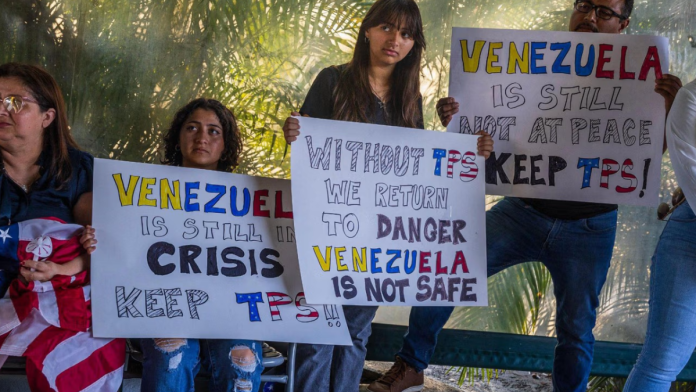The Supreme Court has allowed the U.S. government under President Donald Trump to move forward with revoking a special immigration protection for thousands of Venezuelans living in the United States. This protection, known as Temporary Protected Status (TPS), gave many Venezuelans the ability to live and work legally in the country. With this ruling, these protections are at risk, and some Venezuelans could face deportation.
The court’s action came after California District Judge Edward Chen blocked the government from ending the protections, saying that the proper legal procedures were not followed. By granting an emergency request, the Supreme Court cleared the way for the Trump administration to proceed with its plan. The decision does not end the legal battle but allows the government to act while the case continues.
The Supreme Court’s move drew criticism from some justices, including Justice Ketanji Brown Jackson, who argued that repeatedly stepping in on cases like this can harm people whose lives depend on these protections. The court, however, did not provide a detailed explanation for its decision.
Trump announces plans for 100% tariffs on foreign-made movies
Background on Temporary Protected Status
Temporary Protected Status is a federal program that provides humanitarian relief to people from countries experiencing war, natural disasters, or political turmoil. It allows eligible individuals to stay in the U.S. legally and work for a set period. TPS does not give permanent residency or citizenship, but it can be extended in certain situations.
Venezuelans were granted TPS protections in March 2021 under the Biden administration due to political instability and economic crises in their home country. At that time, about 600,000 Venezuelans became eligible to live and work in the U.S. legally. Their protections were originally set to last until 2026, offering a sense of security to families and workers who had fled hardship at home.
YouTube to pay $24.5 million to settle lawsuit related to President Trump’s account ban
The recent decision from the Supreme Court affects these protections, meaning the U.S. government can now move to end TPS for Venezuelans. Those who lose this status could be subject to deportation, although they may explore other legal options, such as applying for asylum.
Reactions and Legal Arguments
The U.S. government, with Assistant Homeland Security Secretary Tricia McLaughlin, has argued that Temporary Protected Status was always meant to be temporary. Officials stated that extending it too long can turn the program into a backdoor for permanent residency, which is not its purpose. They described the Supreme Court’s decision as a “victory for common sense” and said it restores the intended temporary nature of the program.
USCIS reveals 275 cases of suspected immigration fraud in Minnesota operation
On the other hand, advocates and lawyers, including Ahilan Arulanantham, who represents the Venezuelan plaintiffs, criticized the ruling. They warned that removing TPS protections could put thousands of people at risk and disrupt their lives. Legal experts emphasized that the Supreme Court’s emergency intervention is unusual and has happened multiple times in recent years, raising concerns about the balance between law and human impact.
TPS for Venezuelans has been a lifeline for many families, allowing parents to work, children to attend school, and people to live without the fear of immediate deportation. The Supreme Court’s decision does not yet remove TPS for everyone, but it does allow the government to continue the process of ending it.
This ruling is part of a larger debate about immigration policies and how temporary protections should be managed. With hundreds of thousands of Venezuelans affected, the decision has drawn national attention and sparked discussion about the role of the courts in immigration matters.


